25 Ways to Boost Your Energy Without Coffee

When you’re feeling tired or sluggish, you probably do the same thing as millions of other people: reach for a cup of coffee. While that’s hardly abnormal or unhealthy, relying on a caffeine jolt (or half a dozen of them) can lead to a lower rate of return with each subsequent drink, requiring you to drink more to feel awake. Then, there are those of us who get jittery from a caffeine rush or the folks who can’t have it for medical reasons—all of which is why we set out to learn how to get energy without caffeine. Keep reading to hear wellness experts’ best tips for a healthy boost.
RELATED: 6 Signs You Aren’t Drinking Enough Water, According to Doctors.
How to Get Energy Without Caffeine
1. Take a cold shower.

Whether you need one or not, this is a quick way to wake up your body and give your brain a boost of energy. You can start warm and slowly reduce the temperature if starting out chilly is too much.
“Stay in as long as you can—maybe 30 seconds at first, and you can build up to one to three minutes over time,” says Denny Hemingson, diet and lifestyle expert and functional diagnostic nutrition practitioner. “The cold water is invigorating and it also activates brown fat, growth hormone, and androgens to help give you the drive to take on the day.”
In addition, Alex Trevatt, MD, clinical lead at Avon Aesthetics and CEO of Medistudents, previously told Best Life that “cold water exposure has been shown to release endorphins, which are natural painkillers and mood-enhancers.”
However, be sure to speak to your doctor if you plan to give this a try, as there are some health risks associated with cold showers.
2. Dry brush your body.

Before hopping in the shower, you can wake your body up by “dry brushing,” or using a wooden brush to rub your skin all over.
In addition to detoxifying your skin, dry brushing stimulates your nervous system, according to the Cleveland Clinic. “It can also leave you feeling invigorated like a massage often does,” they note.
3. Drink more water.

You’ve heard about how important water is for your health, but it may not have occurred to you that staying hydrated can help elevate your energy as well.
“Many people don’t connect low energy with dehydration,” notes Ginny Wright, a nutrition coach and personal trainer. She advises drinking a third of your body weight in ounces of water every day—beginning first thing in the morning.
“A warm cup of water with a bit of lemon is a good way to start,” she says. “Then continue drinking water throughout the day.”
4. Exercise when you wake up.
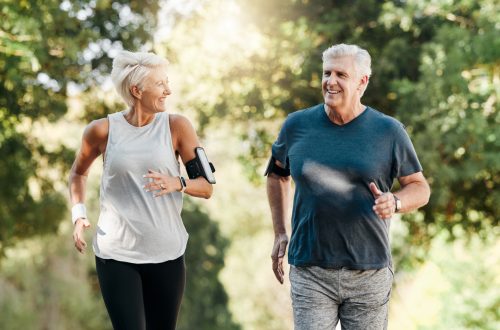
Just like hydration, it’s no surprise that exercise is good for you, but if you usually work out in the evening, you might consider adjusting your schedule. A morning workout or stretching session will give you a burst of energy that can last you into the early afternoon.
Wright suggests this routine: “Get right out of bed and get moving. Start slow with a gentle stretch of your major muscles. Do a forward fold to decompress your spine; pull your heel up to your glutes to stretch your quads, and give a big roll of the shoulders. Now slowly elevate your heart rate by moving your body in a way that you enjoy and that challenges you. Maybe a body-weight workout or swimming or cycling. Bonus points for exercising outside and connecting with nature.”
5. Take a morning walk.

A brisk morning stroll can quickly charge up your energy levels.
“This does not have to be long, but even just stepping outside for a few minutes in the sun will ensure your circadian rhythms are running right,” says life coach Andrea Traviliian. “The morning sun has more blue light to get you going.”
RELATED: Why Walking Only 3,867 Steps a Day Is All You Need, Science Says.
6. Take the stairs.
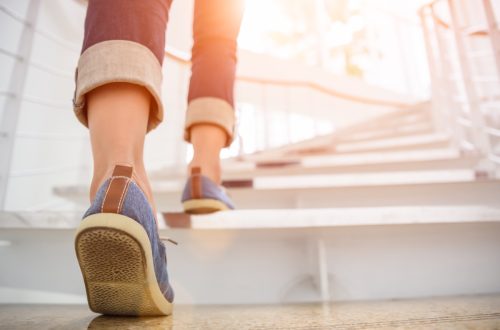
Research from 2017 compared the effects of 10 minutes of low- to moderate-intensity stair walking with a standard intake of caffeine. The study found that stair walking “has transient energizing effects that exceed a low dose of caffeine for active young women with chronic insufficient sleep.”
7. Be deliberate about your stretches.
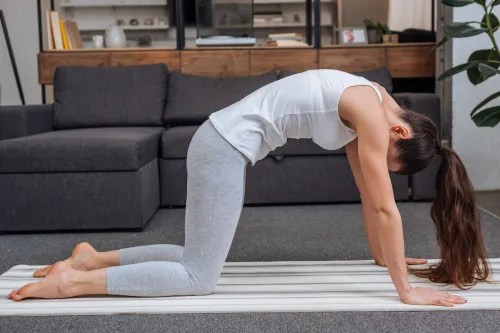
Not all stretches are created equal, and according to a previous Best Life article, five, in particular, can boost your energy.
A couple of the best are two of the most foundational yoga movements. The first is a cat-cow pose, where you arch and round your back while on your hands and knees.
Not only does cat-cow provide energy by increasing spinal fluid circulation, but it “is also great for stimulating your digestive system, which can give you more energy as well,” said Brandt Passalacqua, the founder, director, and lead teacher at Breathing Deeply Yoga Therapy.
The second stretch is a downward-facing dog. “Since this is an inverted pose, it encourages blood flow and energizes and calms the body down at the same time,” explained Gina Iovenitti, an expert in exercise science who works in growth operations for cardiac and pulmonary rehab-based company Carda Health.
8. Do a micro workout during the day.
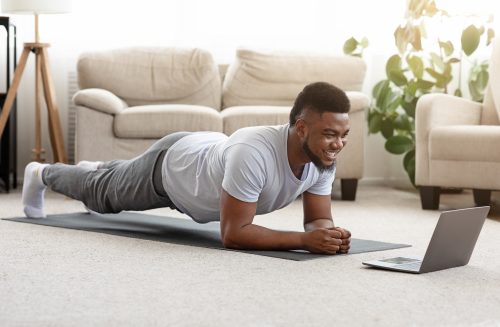
If you feel that you’re losing energy in the afternoon, take a short walk or do a quick core workout to get your heart rate—and energy levels—back up.
“Do some push-ups or jumping jacks to get your blood pumping oxygen to your muscles,” suggests Wright. “Stretch your arms over your head, lean and stretch to both sides, and touch toes before sitting back down.”
9. Eat more veggies.
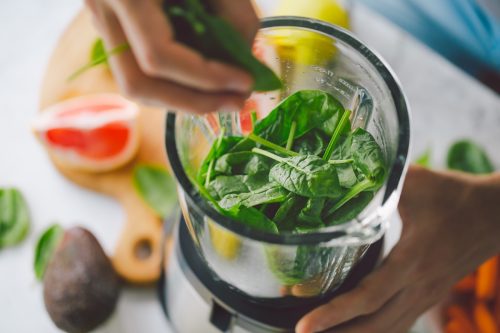
Eating more vegetables can have a major impact on your energy levels since they are rich in nutrients that serve as fuel for your body.
For example, leafy greens like kale and spinach are full of iron and magnesium, which both affect your body’s energy levels. “Inadequate intake of these nutrients can lead to fatigue, weakness, and decreased energy,” Taylor Osbaldeston, RHN, a registered holistic nutritionist at Durand Health, previously told Best Life.
Jeanette Kimszal, a nutrition and fitness expert, says that, in general, you should consume between nine and 10 servings of vegetables a day. “This may seem like a lot but it is only one half to one cup per serving,” she notes. “This means if you add three cups to each meal, you will be at the recommended intake.”
10. Add chia seeds to your cereal.
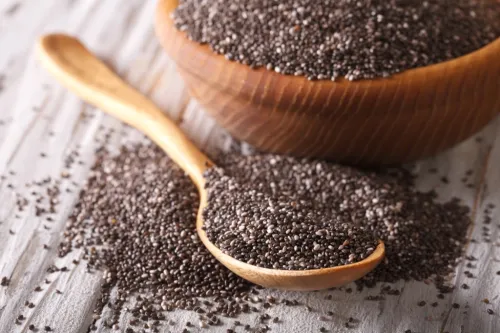
Chia seeds have earned the “superfood” designation thanks to their high concentration of nutrients, antioxidants, and Omega-3 fatty acids (more than salmon, gram for gram). They also give you a little zip of energy.
“This food packs a punch with fiber, protein, and healthy fat that will give you a boost of energy you need in the morning,” explains Kimszal.
RELATED: 7 Easy Things You Can Do Every Day to Keep Your Mind Sharp.
11. Eat raw cacao.
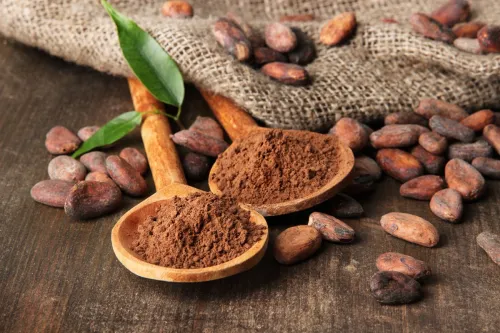
Fitness coach Kylene Terhune swears by eating raw cacao as an alternative to a cup of coffee: “Raw cacao has PEA (phenylethylamine), which is known to increase energy levels in some. Depending on your level of responsiveness, it may energize you in a similar way to a shot of espresso.”
12. Add magnesium to your diet.
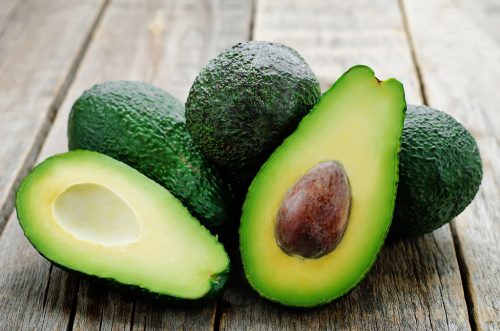
Adding magnesium to your diet can be an excellent way to feel more awake. “This is helpful for breaking down glucose into energy,” says Nikki Walter of Bodybuilding.com.
She suggests almonds or whole grains for breakfast. Avocado is also a favorite high-magnesium choice.
13. Raise your fiber intake.
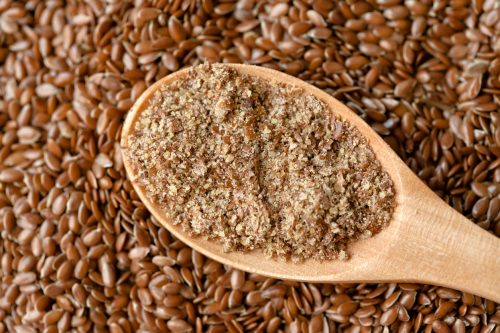
A high-fiber breakfast is an excellent way to start the day. A standard American breakfast of meat, dairy, and processed foods can spike your sugar and fat levels and lead to the inevitable crash an hour or two later.
Instead, life coach Kathy McCabe suggests trying “a blueberry and almond-butter smoothie, made with your favorite non-dairy milk. Throw in a little flax for your omega-3s and a couple of frozen broccoli spears or a handful of spinach for extra anti-oxidants. You won’t taste the greens.”
14. Take herbal supplements.
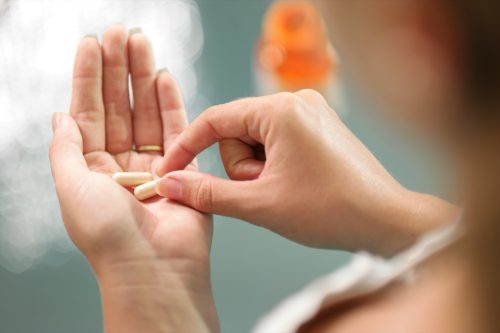
Hemingson recommends a few specific herbal supplements to help with your energy levels.
“Adaptogenic herbs like rhodiola, ashwagandha, and ginseng can all help create an energetic, focused, and relaxed state of being,” he says.
In terms of ginseng, a 2013 study found that Panax ginseng, also known as Korean ginseng, had “antifatigue effects.”
Of course, speak to your doctor before adding any new supplements to your routine.
15. Take vitamin B supplements.
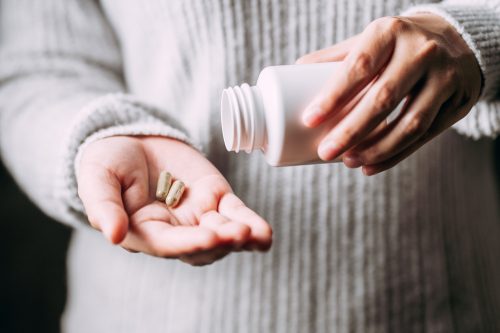
Again, speak to your doctor before doing so, but taking vitamin B supplements—sometimes referred to as “the energy vitamins“—can help with your alertness.
According to the Harvard T.H. Chan School of Public Health, there are 8 different B vitamins, which “help a variety of enzymes do their jobs, ranging from releasing energy from carbohydrates and fat to breaking down amino acids and transporting oxygen and energy-containing nutrients around the body.”
RELATED: 7 Easy Stretches You Can Do at Your Desk Chair.
16. Use a standing desk.

Sitting for long periods can wreak havoc on your body, and it can also make you feel tired, likely because of the lack of blood circulation. That’s why you may want to consider working at a standing desk.
In fact, a 2011 study found that those who used standing desks as opposed to sitting at traditional desks were less fatigued. Moreover, 87 percent of the study participants said they felt increased energy throughout the day when using a standing desk.
17. Let in natural light.

A 2014 study compared office workers with access to natural light with those who were in a windowless room. Unsurprisingly, the latter group experienced poor “sleep, quality of life, and overall health.” One of the reasons for this is that natural light regulates our circadian rhythms, which tell our bodies when it is time for sleep and waking.
“Dimly lit rooms can make you feel tired and lethargic and even lead to symptoms of seasonal affective disorder (SAD). It is important to maximize natural light by keeping windows unobstructed and using light-colored window treatments,” Kentucky-based psychologist Nick Bach, PsyD, previously shared with Best Life.
18. Take a power nap.

If you find your energy flagging toward the afternoon, finding a quiet place to take a brief nap can transform the second half of your day much more effectively than another cup of coffee.
“Compared to caffeine, napping can bring better memory and learning,” writes WebMD, adding that “a 20-minute nap can help you battle heavy eyelids.”
However, they recommend keeping your nap to 30 minutes or less “so you don’t wake up feeling more tired.”
19. Crank the tunes.
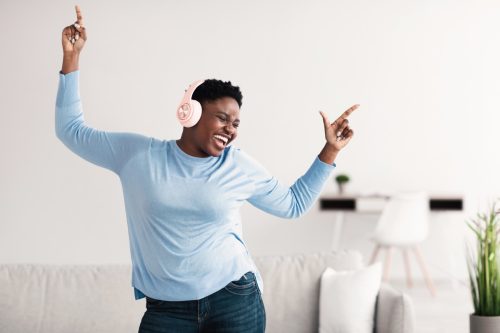
If you’ve ever turned up your favorite songs while on a run, you know the power of a good pump-up playlist. Music can work miracles on your energy levels and truly give you that boost of energy without caffeine.
“Play something upbeat and positive that gets you into a good mood, even if you had a rough start,” urges Walter.
20. Incorporate aromatherapy.

Your sense of smell is more powerful than you realize. Though we often associate aromatherapy with feeling calm, certain scents can have energizing properties.
According to the Sleep Foundation, rosemary “helps activate the brain and may promote alertness and overall cognition,” peppermint “has boosted memory recall and feelings of alertness” in some research, and sage is “associated with enhanced mental performance,” according to preliminary studies.
RELATED: 7 Ways to Motivate Yourself to Wake Up Early.
21. Meditate for a few minutes.
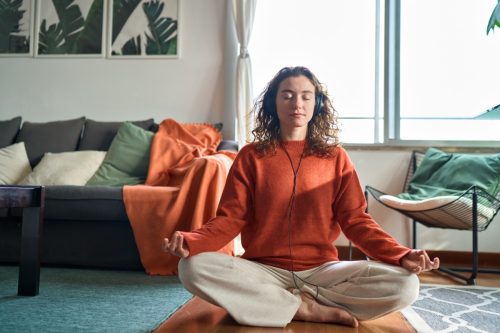
Sometimes the best thing you can do to feel refreshed is to slow down.
“Take five minutes to do some deep breathing and keep your focus on your breath,” advises Hemingson. “If your mind wanders, just bring it back to your breath. It’s amazing what this can do for your mental energy and it readies you to take on the day.”
22. Write in a journal.

Sometimes the most effective way to raise your energy without caffeine is not through anything you do with your body, but by accessing your brainpower. By writing down what’s on your mind, you can better focus your energy and spark your creativity.
“Take five to 20 minutes to write down your thoughts, feelings, and your ‘to-dos,'” recommends McCabe. “This is a powerful practice and time creator. Taking this time will help you see what is ‘running through your brain,’ and help you organize your top priorities for the day.”
23. Say positive affirmations.

Like journaling, the benefits of saying positive affirmations to yourself have been backed by science and research. Practice positive self-talk in the morning and you will reframe your feelings and help take charge of your emotions—rather than feeling helpless in the face of them.
“For example, if you are unmotivated to work, take a moment to decide how you want to feel that day,” suggests McCabe. “It could be, ‘I want to feel focused and calm and not overwhelmed.'”
24. Stop drinking.

Dry January has become such a popular movement that in 2022, a group of researchers studied the “harm reduction benefits” of abstaining from alcohol for one month. They found that 56 percent of participants reported improved sleep, while 52 percent cited increased energy.
25. Get seven to nine hours of sleep.
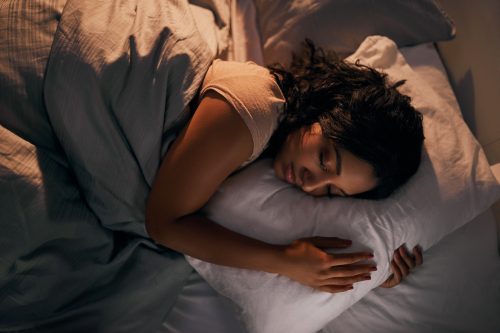
Yes, it’s a no-brainer, but the best way to ensure you’ve got a burst of energy without caffeine in the morning is to get enough sleep at night.
A 2015 study published in Sleep Health: The Journal of the National Sleep Foundation found that adults ages 18 to 64 should get seven to nine hours of rest each night. So, make sure you go to bed early to wake up feeling refreshed and ready to take on the day.
For more wellness advice sent directly to your inbox, sign up for our daily newsletter.
- Source: https://health.clevelandclinic.org/the-truth-about-dry-brushing-and-what-it-does-for-you/
- Source: https://www.sciencedirect.com/science/article/abs/pii/S0031938416310666
- Source: https://pubmed.ncbi.nlm.nih.gov/23613825/
- Source: https://www.hsph.harvard.edu/nutritionsource/vitamins/vitamin-b/
- Source: https://pubmed.ncbi.nlm.nih.gov/23057991/
- Source: https://www.ncbi.nlm.nih.gov/pmc/articles/PMC4031400/
- Source: https://www.ncbi.nlm.nih.gov/pmc/articles/PMC8895623/
- Source: https://www.sleephealthjournal.org/article/S2352-7218(15)00160-6/fulltext